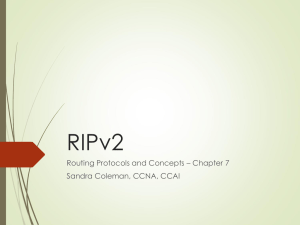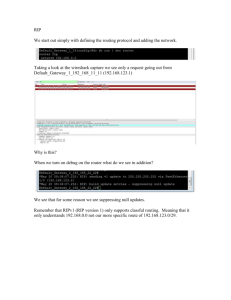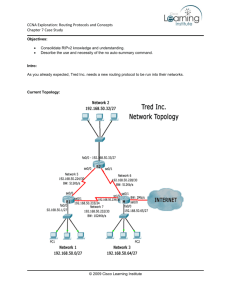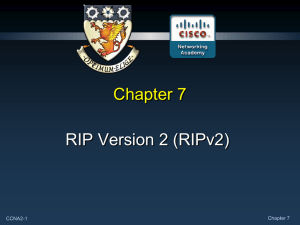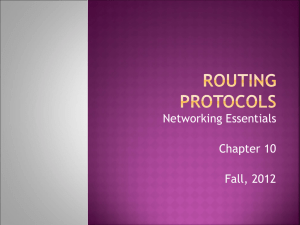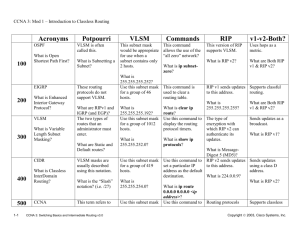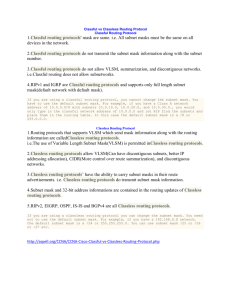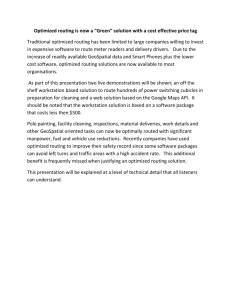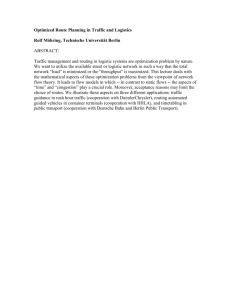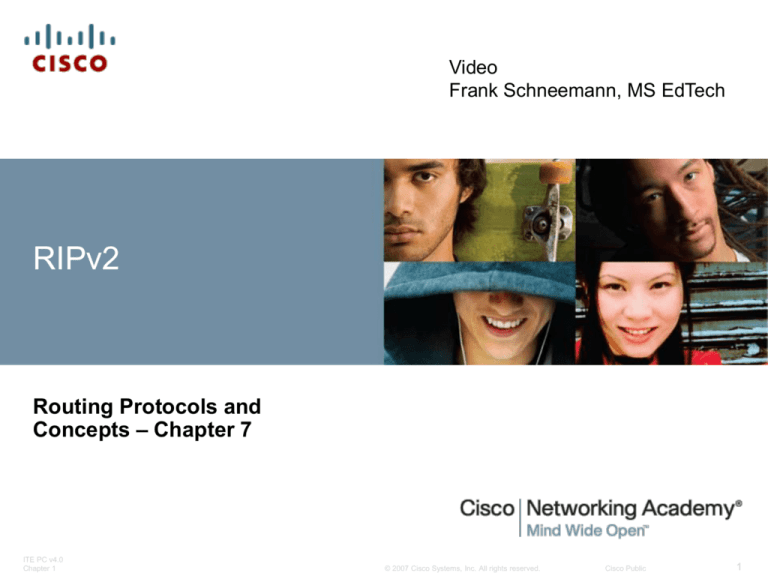
Video
Frank Schneemann, MS EdTech
RIPv2
Routing Protocols and
Concepts – Chapter 7
ITE PC v4.0
Chapter 1
© 2007 Cisco Systems, Inc. All rights reserved.
Cisco Public
1
7.0.1 Chapter Introduction
•
•
•
•
•
Encounter and describe RIPv1’s limitations.
Apply the basic Routing Information Protocol Version
2 (RIPv2) configuration commands and evaluate
RIPv2 classless routing updates.
Analyze router output to see RIPv2 support for VLSM
and CIDR
Identify RIPv2 verification commands and common
RIPv2 issues.
Configure, verify, and troubleshoot RIPv2 in “handson” labs
7.0.1 Chapter Introduction
• Chapter focus
-Difference between RIPv1 & RIPv2
RIPv1
•
•
•
•
•
-A classful distance vector routing protocol
-Does not support discontiguous subnets
-Does not support VLSM
-Does not send subnet mask in routing update
-Routing updates are broadcast
RIPv2
• -A classless distance vector routing protocol that is an
enhancement of RIPv1’s features.
• -Next hop address is included in updates
• -Routing updates are multicast
• -The use of authentication is an option
7.0.1 Chapter Introduction
• Similarities between RIPv1 & RIPv2
-Use of timers to prevent routing loops
-Use of split horizon or split horizon with poison reverse
-Use of triggered updates
-Maximum hop count of 15
7.0.1 Chapter Introduction
7.1.1 Lab Topology
7.1.1 Lab Topology
This topology is
discontiguous and will not
converge because
172.30.0.0/16 is divided
by the 209.165.200.0/24.
Scenario:
• 3 router set up
• Topology is discontiguous
• There exists a static summary route
• Static route information can be injected into routing table updates
using redistribution.
• Routers 1 & 3 contain VLSM networks
7.1.1 Lab Topology
A loopback interface is a
software-only interface
that is used to emulate a
physical interface. Like
other interfaces, it can
be assigned an IP
address.
7.1.1 Lab Topology
Scenario Continued
• VLSM sub netting
the subnet
• Private IP
addresses are on
LAN links (10, 172,
192)
• Public IP
addresses are
used on WAN links
209.165.200.0
• Loopback
interfaces
-These are virtual
interfaces that can
be pinged and
added to routing
table
7.1.1 Lab Topology
172.30.0.0/16 subnetted for R1 and R3
7.1.2 RIPv1 Limitations
Null Interfaces
This is a virtual interface that does not need to be created or configured
•-Traffic sent to a null interface is discarded
•-Null interfaces do not send or receive traffic
Static routes and null interfaces
• null interfaces will serve as the exit interface for static route
• Example of configuring a static supernet route with a null interface
• R2(config)#ip route 192.168.0.0 255.255.0.0 Null0
7.1.2 RIPv1 Limitations
Route redistribution
• -Redistribution command is way to disseminate a static route from one
router to another via a routing protocol
• -Example
R2(config-router)#redistribute static
7.1.2 RIPv1 Limitations
Verifying and Testing Connectivity
Use the following commands:
• show ip interfaces brief
• ping
• Traceroute
RIPv1 – a classful routing protocol
• -Subnet mask are not sent in
updates
• -Summarizes networks at major
network boundaries
• -if network is discontiguous and
RIPv1 configured convergence
will not be reached
7.1.2 RIPv1 Limitations
7.1.2 RIPv1 Limitations
Use the Packet Tracer Activity to
practice your router configuration
skills, including RIPv1 configurations.
7.1.2 RIPv1 Limitations
Examining the routing tables
-To examine the contents of routing updates use the debug ip rip
command
-If RIPv1 is configured then Subnet masks will not be included with the
network address
7.1.3 RIPv1 Discontiguious Networks
Because the subnet mask is not included in the update, RIPv1 and other
classful routing protocols must summarize networks at major network
boundaries. In the figure, RIPv1 on both the R1 and R3 routers will
summarize their 172.30.0.0 subnets to the classful major network address
of 172.30.0.0 when sending routing updates to R2. From the perspective of
R2, both updates have an equal cost of 1 hop to reach network
172.30.0.0/16. R2 installs both paths in the routing table.
7.1.4 RIPv1 No VLSM support
• RIPv1 does not
support VLSM
Reason: RIPv1
does not send
subnet mask in
routing updates
• RIPv1 does
summarize
routes to the
Classful
boundary
Or uses the
Subnet mask of
the outgoing
interface to
determine
which subnets
to advertise
7.1.5 RIPv1 No CIDR Support
7.1.5 RIPv1 No CIDR Support
Use the Packet Tracer Activity in
Simulation mode to see that updates
are not sent across classful network
boundaries with RIPv1. In RealTime
mode, verify non-convergence with the
show ip route, ping, and debug ip rip.
7.2.1 Enabling and Verifying RIPv2
Comparing
RIPv1 & RIPv2
Message
Formats
• -RIPv2
Message
format is
similar to
RIPv1 but
has 2
extensions
• 1st extension
is the subnet
mask field
• 2nd extension
is the addition
of next hop
address
7.2.1 Enabling and Verifying RIPv2
Enabling and Verifying RIPv2
• Configuring RIP on a Cisco router
By default it is running RIPv1
• Notice that the version 2 command is used to
modify RIP to use version 2.
• This command should be configured on all
routers in the routing domain.
• The RIP process will now include the subnet
mask in all updates, making RIPv2 a classless
routing protocol
7.2.1 Enabling and Verifying RIPv2
Configuring
RIPv2 on a Cisco
router
-Requires using
the version 2
command
-RIPv2 ignores
RIPv1 updates
To verify RIPv2 is
configured use
the
show ip
protocols
command
To revert to RIPv1
no version or
version 1
7.2.2 Auto Summary and RIPv2
Auto-Summary & RIPv2
RIPv2 will automatically summarize routes at major network boundaries
and can also summarize routes with a subnet mask that is smaller than
the classful subnet mask
7.2.2 Auto Summary and RIPv2
Because RIPv2 is a classless routing protocol, you might expect to see the individual
172.30.0.0 subnets in the routing tables. However, when we examine the routing
table for R2 in the figure, we still see the summarized 172.30.0.0/16 route with
same two equal cost paths. Routers R1 and R3 still do not include the 172.30.0.0
subnets of the other router.
7.2.2 Auto Summary and RIPv2
7.2.2 Auto Summary and RIPv2
By default, RIPv2 automatically summarizes networks at major network
boundaries, just like RIPv1. Both R1 and R3 routers are still summarizing their
172.30.0.0 subnets to the class B address of 172.30.0.0 when sending updates out
their interfaces on the 209.165.200.228 and 209.165.200.232 networks,
respectively. The command show ip protocols verifies that "automatic
summarization is in effect."
7.2.2 Auto Summary and RIPv2
The only change resulting from the version 2 command is that R2 is now including
the 192.168.0.0/16 network in its updates. This is because RIPv2 includes the
255.255.0.0 mask with the 192.168.0.0 network address in the update. Both R1
and R3 will now receive this redistributed static route via RIPv2 and enter it into
their routing tables.
Note: Remember, the 192.168.0.0/16 route could not be distributed with RIPv1
because the subnet mask was less than the classful mask. Because the mask is not
included in RIPv1 updates, there was no way for the RIPv1 router to determine
what that mask should be. Therefore, the update was never sent.
7.2.3 Disabling Auto Summary in RIPv2
Disabling Auto-Summary in RIPv2
To disable automatic summarization issue the no auto-summary
command
Once automatic
summarization has
been disabled,
RIPv2 will no longer
summarize
networks to their
classful address at
boundary routers.
RIPv2 will now
include all subnets
and their
appropriate masks
in its routing
updates.
7.2.4 Verifying RIPv2 Updates
Verifying RIPv2 Updates
When using RIPv2 with automatic summarization turned off
Each subnet and mask has its own specific entry, along with the
exit interface and next-hop address to reach that subnet.
To verify information being sent by RIPv2 use the
debug ip rip command
7.2.4 Verifying RIPv2 Updates
Use the Packet Tracer Activity to
configure RIPv2, disable automatic
summarization, and verify your
configurations.
7.3.1 RIPv2 and VLSM
Because classless routing
protocols like RIPv2 can
carry both the network
address and the subnet
mask, they do not need to
summarize these networks
to their classful addresses
at major network
boundaries. Therefore,
classless routing protocols
support VLSM.
Routers using RIPv2 no longer need to use the inbound interface's mask
to determine the subnet mask in the route advertisement. The network
and the mask are explicitly included in each and every routing update.
7.3.2 VLSM and CIDR
CIDR uses Supernetting
Supernetting is a bunch of contiguous classful
networks that is addressed as a single
network.
7.3.2 VLSM and CIDR
To verify that
supernets are
being sent and
received use the
following
commands
Show ip route
Debug ip rip
7.4.1 Verification and Trouble Shooting Commands
• Basic Troubleshooting steps
-Check the status of all links
-Check cabling
-Check IP address & subnet mask configuration
-Remove any unneeded configuration commands
• Commands used to verify proper operation of RIPv2
– Show ip interfaces brief
– Show ip protocols
– Debug ip rip
– Show ip route
7.4.2 Commond RIPv2 Issues
Common RIPv2 Issues
When trouble shooting RIPv2 examine the following issues:
Version
Check to make sure you are using version 2
Network statements
Network statements may be incorrectly typed
or missing
Automatic summarization
If summarized routes are not needed then disable
automatic summarization
7.4.2 Commond RIPv2 Issues
Reasons why it’s good to authenticate routing information
-Prevent the possibility of accepting invalid routing
updates
-Contents of routing updates are encrypted
Types of routing protocols that can use authentication
-RIPv2
-EIGRP
-OSPF
-IS-IS
-BGP
R1 is propagating a default route to all other routers in this routing domain.
However, someone has mistakenly added router R4 to the network, which
is also propagating a default route. Some of the routers may forward default
traffic to R4 instead of to the real gateway router, R1. These packets could
be "black holed" and never seen again.
7.4.3 Authentication
Use the Packet Tracer Activity to see
how unintentional routing updates can
corrupt the routing table.
7.5.1 Basic RIPv2 Configuration
In this lab, you will work with a discontiguous
network that is subnetted using VLSM. As you
have seen throughout this chapter and Chapter
5, "RIP version 1", this can be an issue when
the routing protocol used does not include
enough information to distinguish the individual
subnets. To solve this problem, you will
configure RIPv2 as the classless routing
protocol to provide subnet mask information in
the routing updates.
7.5.1 Basic RIPv2 Configuration
Use the Packet Tracer Activity to
repeat a simulation of Lab 7.5.1.
Remember, however, that Packet
Tracer is not a substitute for a handson lab experience with real equipment.
7.5.2 Challenge RIPv2 Configuration
In this lab activity, you are given a
network address that must be
subnetted using VLSM to complete the
addressing of the network. A
combination of RIP version 2 and
static routing will be required so that
hosts on networks that are not directly
connected will be able to communicate
with each other and the Internet.
7.5.2 Challenge RIPv2 Configuration
Use the Packet Tracer Activity to
repeat a simulation of Lab 7.5.2.
Remember, however, that Packet
Tracer is not a substitute for a handson lab experience with real equipment.
7.5.3 RIPv2 Troubleshooting
In this lab, you begin by loading configuration
scripts on each of the routers. These scripts contain
errors that will prevent end-to-end communication
across the network. After loading the corrupted
scripts, troubleshoot each router to determine the
configuration errors, and then use the appropriate
commands to correct the configurations. When you
have corrected all of the configuration errors, all of
the hosts on the network should be able to
communicate with each other.
Use the Packet Tracer Activity to
repeat a simulation of Lab 7.5.3.
Remember, however, that Packet
Tracer is not a substitute for a handson lab experience with real equipment.
7.6.1 Summary and Review
Routing
Protocol
Distance
Vector
Classless
Routing
Protocol
Uses
HoldDown
Timers
Use of
Split
Horizon
or
Split
Horizon
w/
Poison
Reverse
Max
Hop
count
= 15
Auto
Summary
Support
CIDR
Supports
VLSM
Uses
Authentication
RIPv1
Yes
No
Yes
Yes
Yes
Yes
No
No
No
RIPv2
Yes
Yes
Yes
Yes
Yes
Yes
Yes
Yes
Yes
7.6.1 Summary and Review
7.6.1 Summary and Review
The Packet Tracer Skills Integration Challenge Activity
integrates all the knowledge and skills you acquired in
previous chapters of this course and prior courses. Skills
related to the discussion of RIPv2 are also included. In this
activity, you build a network from the ground up.
Starting with an addressing space and network requirements,
you must implement a network design that satisfies the
specifications, then implement an effective RIPv2 routing
configuration with integrated default routing. Detailed
instructions are provided within the activity.
7.6.1 Summary and Review
ITE PC v4.0
Chapter 1
© 2007 Cisco Systems, Inc. All rights reserved.
Cisco Public
49

